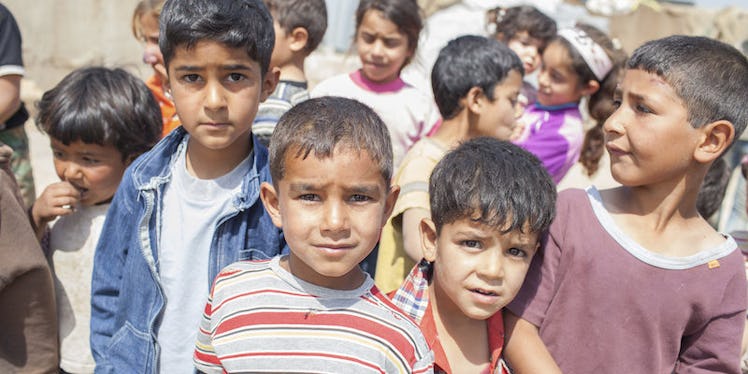
3 Lessons From History That Can Teach Us How To Help Syrian Refugees
The United States of America is no stranger to the plight of refugees. After all, America is a nation of immigrants, founded by those who fled religious persecution in Europe. Since our nation's beginnings, several humanitarian crises have tested the world's capacity for hospitality and compassion.
The latest refugee crisis has displaced more than 12 million Syrians since the outbreak of the country's civil war began in 2011. Over four million have fled to countries like Turkey, Lebanon, Jordan and Germany. However, over 7.6 million remain internally displaced in Syria.
America has accepted roughly 1,500 Syrians since 2011. Yet, in the wake of last year's San Bernardino terrorist attacks, several congressmen and lawmakers have called for a temporary ban on all refugees entering the United States. The fear that terrorists may be able to mix in with the influx of peaceful families seeking solace is understandable, yet unsubstantiated.
Xenophobia is not the answer when debating whether or not to help these families. Here are three ways history has taught us valuable lessons about lending a humanitarian hand to asylum seekers from across the world:
1. Be wary of jingoism and fervent nationalism.
This type of political discourse often influences how people feel about different ethnic groups. A country in enough turmoil can either force out scapegoated groups or refuse to accept individuals perceived as “others.” World War II era Germany is a prime example of this.
Adolf Hitler recognized the anger of the German people burdened with the debt of WWI, and he used that emotion to scapegoat Jews, homosexuals and political rivals. This “othering” served as a basis for his aggressive conquest of Europe. It led to the outbreak of World War II, where around 40 million Europeans were displaced between 1940 to 1945.
2. Get involved with political initiatives that aid people who are displaced.
As is the case with the first lesson, politics is central to understanding why refugees flee their respective homelands. Countless political actions, especially civil and international wars and births of new nations, have uprooted ethnic groups from their homelands. These displacements included the Jews from Europe in the early 1940s, the Palestinians from Pakistan in the late 1940s, the Bosnians from the Balkan States in the 1990s and the Iraqis from Iraq in the mid-2000s.
Still, after WWII, several political laws and organizations were created to help aid in the resettlement of refugees. The United Nations Relief and Rehabilitation Administration, the Geneva Convention and Office of the United Nations High Commissioner for Refugees (UNHCR) were all established as the basis for assistance and humanitarian aid. Fortunately, we have these organizations in place today to help integrate refugees into a society where they can live out their lives freely.
3. Find commonality in the refugee experience, even if only from a political standpoint.
By that, I mean, don't make them feel transient or stateless. This contributes to a hopeless attitude among the refugee population, creates resentment and perpetuates prejudice. As stated above, America is a nation of immigrants. Many Americans today may not know firsthand of the horrors of being forced from your homeland through the threat of genocide or religious persecution.
However, we can still sympathize with these refugees from a political standpoint in that our families all immigrated to this country at some point. We need to realize the United States was founded on the principles of tolerance and inclusion. We need to use this understanding to ease our reticence to welcome these individuals to our homeland, so that perhaps it can become theirs.
The United States plans to accept nearly 85,000 refugees around the world by the end of 2016, so it's important to get in the mindset of welcoming them. Any hospitality Americans can show will undoubtedly go a long way.
History has shown us the warning signs in identifying a humanitarian crisis, and we now know the steps to combat it. Recognize the red flags of xenophobia, bigotry and racism toward a particular group. Understand how the political and economic climate of the region can impact its citizens, and what international organizations and laws exist to help intervene.
Finally, find compassion within your soul to sympathize with this afflicted population, no matter how superficial the reasoning may be. Any rationale you can find to show empathy will go a long way in motivating us to provide aid to our fellow human beings.